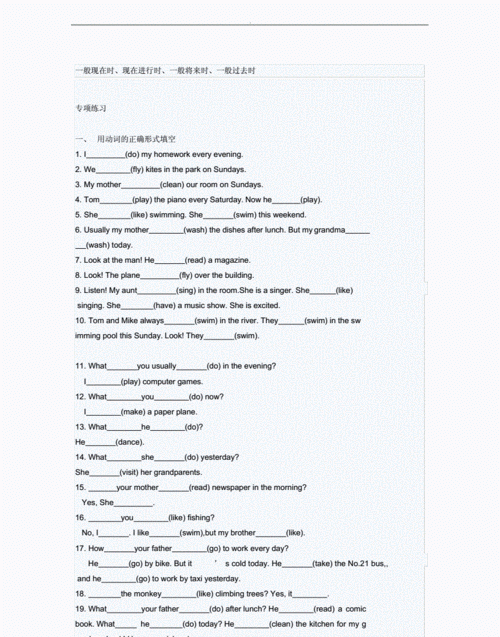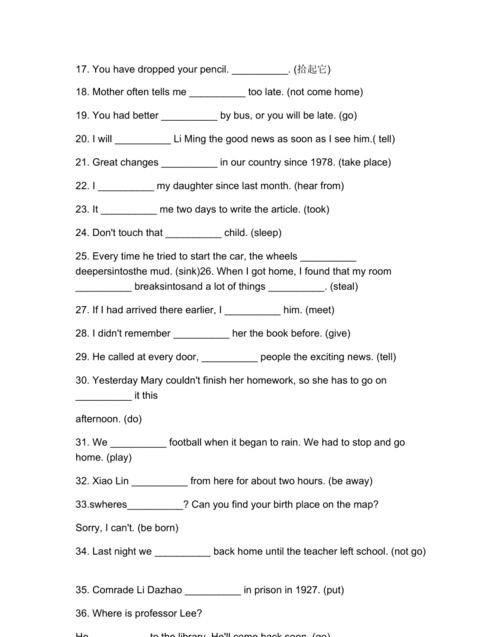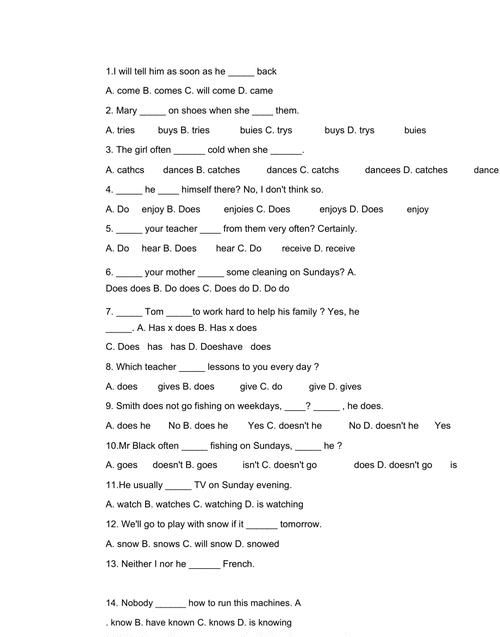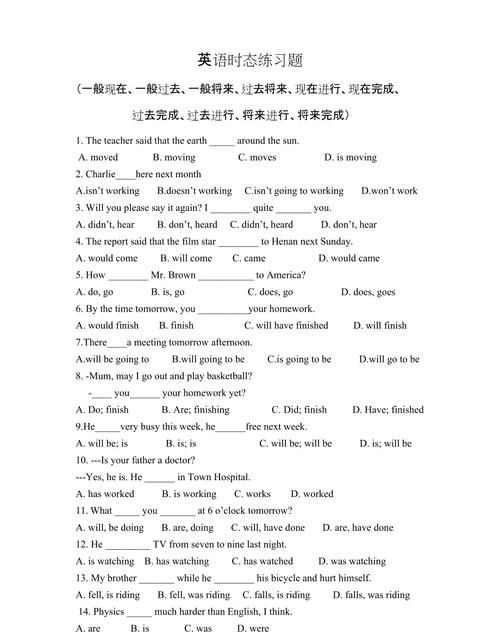本文目录
小学学几种英语时态
2. Mary ___A__ on shoes when she ____ them.(第三人称单数)
A. tries…buys B. tries… buies C. trys… buys D. trys… buies
3. The girl often ____B__ cold when she ______.(以ch结尾单数加es)
A. cathcs…dances B. catches… dances
C. catchs…dancees D. catches… dancee,
4. ____D_ he ____ himself there? No, I don't think so. 第三人称用助动词does,助动词后用动词原形
A. Do…enjoy B. Does… enjoies
C. Does… enjoys D. Does…enjoy
5. _B__ your teacher ____ from them very often? Certainly.收信用hear from第三人称用助动词does,助动词后用动词原形
A. Do…hear B. Does…hear C. Do… receive D. receive
6. ____C_ your mother _____ some cleaning on Sundays?your mother 为第三人称第三人称用助动词does,助动词后用动词原形
A. Does…does B. Do…does C. Does…do D. Do… do
7. ___D__ Tom _____to work hard to help his family ? Yes, he _____.第三人称用助动词does,助动词后用动词原形
A. Has… x…does B. Has…x…does
C. Does…has…has D. Does… have…does
8. Which teacher _B____ lessons to you every day ?第三人称用助动词does,助动词后用动词原形
A. does …gives B. does… give C. do… give D. gives
9. Smith does not go fishing on weekdays, _D___? _____ , he does.
A. does he…No B. does he…Yes
C. doesn’t he…No D. doesn’t he…Yes
10.Mr Black often ___A__ fishing on Sundays, _____ he ?第三人称用单数go加es,前面否定,后面肯定
A. goes…doesn’t B. goes…isn’t
C. doesn’t go…does D. doesn’t go…is

英文论文的时态使用规则
初中英语时态语态练习题
说明:本套题50题每题2分,共100分。
I.用since或for填空。1. They have been a League member _______ two years.
2. She has been like this ______ yesterday evening.
3. Aunt Zhang came here last year. She has been here ______ about a year.
4. The baby has kept crying _____ her mother left.
5. My brother has lived in Beijing ______ thirty years ago.
II.用现在完成时改写句子1. Miss Wang went to Shanghai this morning. Miss Wang _______ _______ to Shanghai already.
2. She gave the book back to him yesterday afternoon.She _____ _____ the book back to him ______.
3. I bought the computer last Sunday. I _____ ______ the computer _____ nearly a week.
4. He didn’t see the film. He ____ _____ the film.
5. I joined the League last month. I _____ _____ a _____ ______ ______ more than a month.
Keys: I. 1. for 2. since 3. for 4. since 5. since
II. 1. has gone 2. has given; already 3. have had/kept; for 4. hasn’t seen 5. have been; League member for
现在完成时综合练习;I. 用括号内所给动词的正确时态填空
A: Where is Lucy?
B: She ____ (go) to Tianjin.
A: Really? When ____ she ____ (go) there?
B: This morning.
A: How many times _____ she ____ (be) there before?
B: Four times.
A: Do you know when she _____ (come) back?
B: She ____ (be) back in a week.
II. 译译看 1.她曾去过海口吗?__________________________
2.我去过太原,我去年去的。__________________________
3.格林一家已经去青岛度假了。__________________________
4.你以前从没去过那儿,是吗?__________________________
5.我哥哥入党已经两年了。__________________________
答案为:Keys: I. has gone; did, go; has, been; will come; will be II. 1. Has she ever been to Haikou? 2. I have been to Taiyuan, and I went there last year. 3. The Greens have gone to Qingdao for the holiday. 4. You have never been there before, have you? 5. My brother has been in the Party for two years.
1、[单选] 第一组(以下各题均选自2004年各省市中招试题) 1. —______ may I keep these books?
—Two weeks.(新疆)
A. How often B. How far C. How long D. How soon
2. —______ will the train arrive at Jingmen Station?
—In ten minutes.(湖北荆门)
A. How long B. How soon C. How far D. How often
3. —_____ have you been here?
—For a month.(辽宁)
A. How often B. How far C. How long D. How soon
4. —_____ is the Confucian Temple(孔庙)from here?
—It’s about 10 minutes’walk.(浙江衢州)
A. How many B. How long C. How much D. How far
5. —Excuse me, sir. ____ is it to the nearest hotel from here?
—About 15 minutes’walk along this road.(天津)
A. How much B. How soon C. How far D. How long
6. —_____ do you go to Hong Kong?
—Sorry, I’ve never been there.(天津)
A. How long B. How often C. How far D. How soon
7. —____ do you write to your pen friend?
—Twice a month.(福建福州)
A. How often B. How soon C. How long D. How many
8. —____ were the travelers away from Meizhou Island?
—Less than a month.(福建莆田)
A. How often B. How long C. How much D. How many
9. —___ have you been a green volunteer?
—For more than three years.(北京丰台区)
A. How often B. How long C. How soon D. How much
10. —______ do you play basketball?
—Twice a week.(北京朝阳区)
A. How often B. How much C. When D. Where
答案为:Keys:1-5 CBCDC 6-10 BABBA
1、[单选] 第二组 1. When I looked into the room, I found Philip himself _____ in bed.
A. lies B. lie C. lay D. lying
2. She taught us ______ those difficult words. A. to pronounce B. pronounced
C. pronouncing D. pronounce
3. If you don’t know a word, you can ___ in a dictionary.
A. look for it B. look it for
C. look it up D. look up it
4. He ______ the door and entered the office.
A. knocked B. knocked at
C. knocked into D. knocked out
5. Walk along this street _______ and you’ll find the hospital.
A. in the end B. to the end
C. by the end D. at the end
6. He found it hard ________ his class.
A. to catch up with B. to catch up
C. catch up with D. catch up
7. The story ______ is very interesting.
A. there is B. it’s C. its D. itself
8.— How do you like this blue sweater?
— I prefer blue, but this one is too ______.
A. dark B. black C. deep D. white
9. — Thank you for having me.
— ______.
A. I’m sorry B. Not at all
C. No, I’m not D. Excuse me
10. — Is Wang Lin old enough to join the army?
— Yes. But he’s ______ to be a soldier.
A. quite short B. very short
C. too short D. much short
11. — How can I learn my English well?
— You’d better ______ your English as often as
possible, or you’ll forget it very soon.
A. take B. use C. spend D. cost
12. — How deep is the hole?
— It’s very deep. It is a ______ hole.
A. four metre deep B. four metres deep
C. four-metre-deep D. four-metres-deep
13. — Remember ___ him about it before he goes away. — Sure, I will.
A. tell B. to tell C. telling D. to telling
14. After breakfast Bob read the newspaper for his
grandma, _______ she listened to him carefully.
A. so B. or C. and D. but
15. — Will you please ______ us a story, Miss Gao? — OK. Shall I ______ it in English or in Chinese?
A. tell; speak B. talk; speak C. tell; say D. talk; say
16. Don’t worry! I’m sure you’ll ______ your
classmates if you are kind and friendly to them.
A. catch up with B. agree with
C. get on well with D. make friend with
17.— Is the old man still alive?
— I’m sorry he’s ______. He ______ one week ago.
A. dead; died B. dying; dead C. dying; died D. died; dead
18. Mr Smith always has _____ to tell us.
A. some good pieces of news B. some pieces of good news C. some good piece of newes D. some piece of good newes
19.— Who won the high jump?
— Bill did. He jumped ______ all the others.
A. higher than B. as high as C. highest of D. the highest
20. — How are you today?
— I’m feeling ______ than yesterday.
A. worst B. well C. worse D. bad
1-5 DACBB 6-10 ADABC 11-15 BCBCC 16-20 CABAC

英语时态基础知识大全
11动作发生在过去。即1936前,根据前面句意,所以一定是过去时。
12刚才没听清,表示结果,过去的结果用一般过去时。couldn’t表能力不表结果。
13上文的时态是过去时,说明回答中也用过去时。
14同上。
15从句用过去时。主句的动作也发生在过去。即在从句动作之中。
16用told说明与说话时间比这一动作发生在说话以前,所以用过去时。
17 所填空与turned off是并列谓语时态要一致。所以用过去时。
18Keep quiet, please这个祈使句说明是现在的要求。所以后面要用现在进行时。
19上文的is leaving进行时表示将来时,下文也用将来时。
20 条件状语从句用一般现在时表示将来时,所以主句用将来时,从句用一般现在时。

初中英语所有时态总结
时态(tense)是一种动词形式,不同的时态用以表示不同的时间与方式。它是表示行为、动作、状态在各种时间条件下的动词形式,下面告诉你初中英语时态练习,大家一起来看看吧!初中英语时态练习:初一英语动词时态练习题之一般将来时,用所给词的适当形式填空,完成句子。1. It ___________________ (be) my birthday next Thursday.2. All the young people in the town are glad __________ (hear) that a famous musician _____ (give) a concert this Saturday evening.3. I _____________ (wirte) to you as soon as I get to Guangzhou.4. They ________________ (not have) an English Evening this week. They ____________ (have) it next week.5. She ___________ (do) her homework now, but she ___________ (go) to the cinema with her classmates tomorrow evening.6. John is always busy. He ____________ (sleep) only six hours every night.7. They ____________ (plant) trees on the hill next week.8. Jane ________________ (not finish) the work if you don't help her.9. They ______________ (help) Granny Li _____________ (clean) her house tomorrow afternoon.做英语时态考题的常犯错误:一、未理解进行时态表将来意义而出错1. The manager was concerned to hear that two of his trusted workers ______. (2012山东卷)A. will leave B. are leaving C. have left D. were leaving.分析:根据句意,空格处可用过去将来时或过去完成时,分别表示员工将要离开或已经离开让经理很担心,但句中既没有过去将来时也没有过去完成时,所以许多考生不知道如何选择。其实,英语中有时候可用进行时态表示将来意义——用现在进行时表示一般将来,用过去进行时表示过去将来,故此题答案为D。句意为:经理听说他很信任的两名员工要离开感到很担心2. Food supplies in the flood-stricken area ______. We must act immediately before there’s none left. (2012重庆卷)A. have run out B. are running out C. have been run out D. are being run out分析:根据We must act immediately before there’s none left(我们必须在食物耗尽前立刻行动)可知,受到洪水侵袭的地区的食品快要耗尽了,所以空格处应填将来时态,但是四个选项中并没有将来时态。其实,此题也是要用进行时态表示将来意义,故答案只能在B和D之间作选择,同时考虑到run out是不及物动词,不能用于被动语态,故只能选B。二、误解句中的时态标志而出错1. — Look! Somebody ______ the sofa.— Well, it wasn’t me. I didn’t do it. (2012江西卷)A. is cleaning B. was cleaning C. has cleaned D. had cleaned分析:有的考生一看到句中的look,就以为它是现在进行时的典型标志,从而误选了A。其实,如果句子只有前半部分,答案完全可以选A,即Look! Somebody is cleaning the sofa.这个句子是完全正确的。但如果结合对话的后面一句,则只能选C,对话的意思是:看,有人已经擦干净了沙发。哟,不是我,我没有做。2. The manager _______ the workers how to improve the program since 9 am. (2012全国卷II)A. has told B. is telling C. has been telling D. will have told分析:有的考生一看到句中的since 9 am 就以为它是现在完成时的典型标志,从而误选了A。没错,since 9 am 这类时间状语通常与现在完成时连用,但是本句比较特殊,谓语动词tell是一个非延续动词,若用现在完成时has told,它只表示已经告诉了,而不能表示从上午9点开始一直在告诉,故不能选A。要表示从上午9点开始一直在告诉,得用现在完成进行时,即答案为C。警惕做英语时态题的误区:一、滥用时态呼应英语时态在许多情况都是前后呼应的,即上文所用的某种时态与下文所用的某种时态存在一定的关联性。正确地运用时态呼应本来也是一种做时态题的技巧,但是,如果不加理解地滥用它,则会适得其反。如:1. I _________ in London for many years, but I’ve never regretted my final decision to move back to China. (重庆卷)A. lived B. was livingC. have lived D. had lived【解析】许多同学一看到后面的have never regretted为现在完成时,同时选项C也是现在完成时,结果滥用时态呼应,将答案误选C。其实,此题的最佳答案是A。句中but后的句子告诉我们,说话者现在已搬回了上海,所以他住在伦敦应属于过去的事情,故应用一般过去时。2. He was hoping to go abroad but his parents _________ that they won’t support him unless he can borrow money from the bank. (湖北卷)A. were deciding B. have decided C. decided D. will decide【解析】有的同学一看到句中的was hoping,便想当然地认为答案是A或C。其实,此题的最佳答案是B,用现在完成时表示目前决定已经作出。其实,假若此处填过去时态,它与其后宾语从句中的won’t, can也自相矛盾,故应排除。二、忽略简单时态的特殊用法有的考题从表面上看是考查某种很简单的时态,但命题人有可能是考查这种简单时态的某种特殊用法,同学们做题时一定要引起高度注意。如:Ladies and gentlemen, please fasten your seat belts. The plane _________. (福建卷)A. takes off B. is taking offC. has taken off D. took off【解析】此题答案选B,用现在进行时表示将来意义。The plane is taking off. 的意思是飞机马上就要起飞了。应对时态考题的技巧:一、利用句子语境解题根据语境命题是近几年来高考英语单项填空题的一个十分重要的趋势,可以毫不夸张地说,每年的单项填空至少有百分之九十五的考题或多或少与语境有一定的关系。所以,同学们在做题时,除根据各个时态的不同用法和特点来分析外,还要充分根据句子本身所提供的语境来分析,不仅要使所填时态语法正确,而且要使句子意思通顺,合情合理。如:1. I have to go to work by taxi because my car _________ at the garage.A. will be repaired B. is repaired C. is being repaired D. has been repaired【解析】答案选C。上文说不得不乘的士去上班,这就说明车子正在修理,故用进行时态;又由于车与修理为被动关系,故用现在进行时的被动语态。2. Since I won the big prize, my telephone hasn’t stopped ringing. People _________ to ask how I am going to spend the money. (湖南卷)A. phone B. will phone C. were phoning D. are phoning【解析】答案选D。句子上文说自从我获大奖后,我的电话响过不停,这就说明人们给我打电话这事正在进行,故用现在进行时。3. Scientists think that the continents _________ always where they _________ today.A. aren’t; are B. aren’t; were C. weren’t; are D. weren’t; were【解析】答案选C。句意是:科学家们认为各大陆并非一直在它们现在所处的位置。既然过去的位置与现在的位置不同,所以谈论过去情况用一般过去时。二、利用关键词解题有的时态考题中往往会隐含有一个或几个对解题起着重要作用的词语,这就是我们所说的关键词。同学们在解题时,若能充分挖掘这些关键词,并进行合理地分析和推理,对于得出试题的正确答案将会有很直接的帮助作用。如:1. It is said that the early European playing-cards _________ for entertainment and education.A. were being designed B. have designedC. have been designed D. were designed【解析】答案选D。解答此题的关键是要抓住early这一形容词。early European playing-cards的意思是早期欧洲人玩的扑克牌,既然是早期,肯定就是过去的事了,所以用一般过去时。2. Listen to the two girls by the window. What language _________?A. did they speak B. were they speakingC. are they speaking D. have they been speaking【解析】答案选C。解答此题的关键词是Listen to…(听……),由此可知,空格处要用现在进行时态。

以上就是关于英语时态题目训练及答案,小学学几种英语时态的全部内容,以及英语时态 的相关内容,希望能够帮到您。

